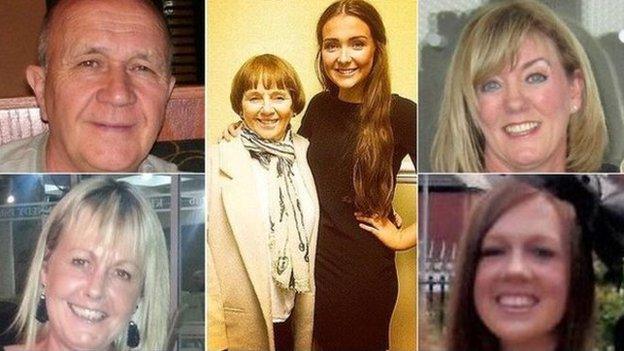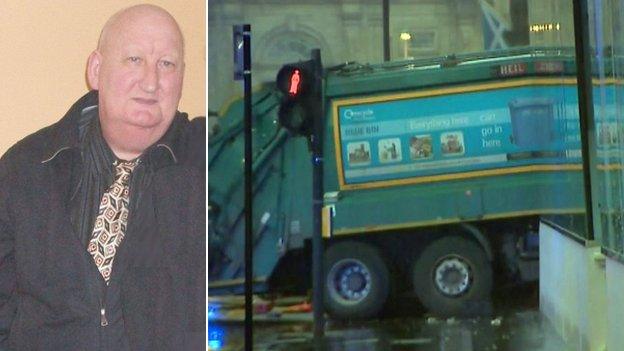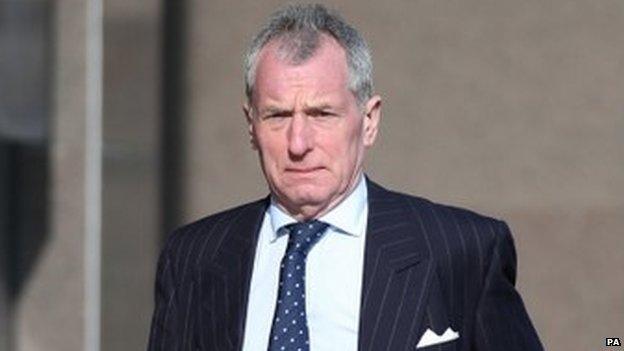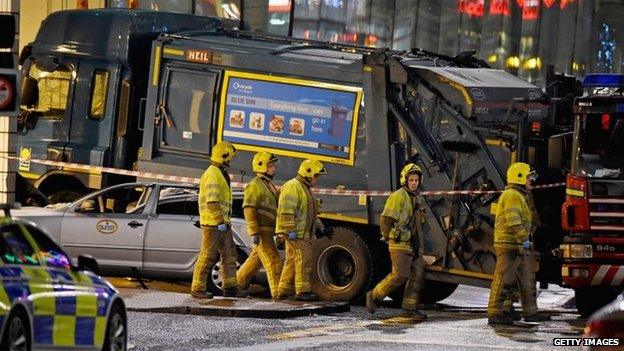Glasgow bin lorry crash: Family oppose 'no prosecution' decision
- Published

(Clockwise from top left) Jack Sweeney, Lorraine Sweeney, Erin McQuade, Jacqueline Morton, Stephenie Tait and Gillian Ewing were killed in the crash
A lawyer for a family which lost three members in the Glasgow bin lorry crash has said they profoundly disagree with a decision not to prosecute anyone.
Jack and Lorraine Sweeney and their 18-year-old granddaughter Erin McQuade died while Christmas shopping.
Their relatives' QC, Mark Stewart, said they were "devastated" by their deaths and expressed "great concern" over how the tragedy was investigated.
He raised the issue at the inquiry into the six deaths on December 22 2014.
The fatal accident inquiry (FAI), which is drawing to a close at Glasgow Sheriff Court, is looking at the health of bin lorry driver Harry Clarke, 58, the bin lorry and its route.
It has already heard that Mr Clarke was unconscious at the wheel when the Glasgow City Council bin lorry veered out of control in Queen Street on 22 December last year.

The inquiry has heard allegations Mr Clarke lied about his medical history to doctors, the DVLA and his employer
Before it crashed into the side of the Millennium Hotel in George Square, the lorry had killed six people and injured 15 others.
The FAI has heard that Mr Clarke had suffered blackouts before.
One of these - at the wheel of a stationary bus in 2010 - was not fully disclosed to his own doctors, the Driver and Vehicle Licensing Agency (DVLA) or on application forms or medical declarations for council jobs.
'Remarkable haste'
In his closing submission on Thursday, Mr Stewart said the Sweeney and McQuade families did not agree that it should have been treated as a road traffic accident and believe there should have been more involvement from the Health and Safety Executive.
Concerns were also raised over the fact that driver Harry Clarke was never interviewed by police after the crash.
Mr Stewart said: "This was an investigation conducted with remarkable haste.

Mark Stewart QC is representing the bereaved Sweeney and McQuade families
"The conclusion of the Crown Office, announced nine weeks after the tragedy, that no basis in criminal law could be established to bring criminal proceedings is one with which the family profoundly disagree."
The Crown Office said in February that no charges would be brought against Mr Clarke and the relevant information had been taken into account regarding a decision not to prosecute.
Earlier, Mr Stewart said the families of Mr and Mrs Sweeney and their granddaughter Erin had been "close" and left "devastated" by tragedy.
Mr Stewart said that the crash could have been avoided if Mr Clarke had been "clear, consistent and truthful" with doctors about his 2010 blackout.
He said these "catastrophic" events could also have been avoided had Mr Clarke revealed full details of his 2010 blackout in a DVLA medical in 2011.
Risk assessment
Mr Stewart also said there were "deficiencies" in Glasgow City Council's risk assessment process for bin collection and the lorry should never have been in a busy area that day.
The QC said the fact that Mr Clarke's false declaration in a DVLA medical in 2011 was not discovered was a "defect in the system" which contributed to the bin lorry crash.
He said drivers needed to be held accountable for lying to the DVLA and a specific offence of failing to properly disclose health issues could be created.
The inquiry also heard from Alistair Forsyth, the advocate for the bereaved Ewing family, who said Mr Clarke's 2010 blackout was of central importance.

Six people died and 15 were injured in the crash
The advocate said Mr Clarke was "somewhat manipulative" over the 2010 episode in that he mentioned different things to different doctors.
Mr Forsyth said that if Mr Clarke had "told the truth" about this incident "he would not have been driving that day".
He also backed submissions by other families' representatives that doctors who examined Mr Clarke in 2010 should have investigated more his claims over the blackout.
The advocate also criticised evidence related to a First Bus reference for Mr Clarke over his application to join Glasgow City Council.
'Host of offences'
He said that if this had been accurate, Mr Clarke would never have been driving for the council.
Mr Forsyth said that by lying over the incident, Mr Clarke could have committed a "host of offences" under the Road Traffic Act and common law fraud.
Rhoderick McIlvride, QC for the DVLA, told the inquiry that between 2011 and the crash, neither Mr Clarke nor any doctor had provided any information about him to the DVLA.
The QC said that given this, it had not been established that any reasonable precaution could have been taken by the DVLA to avoid the crash.
Making his submission on behalf of Glasgow City Council, Peter Gray QC said the crash had happened, not because of anything the council did not do, but because the driver lost consciousness.
He said there were no reasonable precautions the council could have taken to avoid the "appalling tragedy".
This included Mr Clarke's reference from First Bus, risk assessment of the bin lorry route, training for crew members and the fitting of safety systems to vehicles.
In his submission, Liam Ewing, representing bin lorry crew members Matthew Telford and Henry Toal, said there were no reasonable precautions that could have been taken by the crewmen to prevent the accident and this had been backed up by expert witnesses.
The lawyer concluded by referring to Mr Telford's response when asked if there was anything he could have done differently.
Mr Ewing said: "He didn't think he could have done anything differently but said he will always ask himself that question. That remains the position of both Mr Telford and Mr Toal."
The inquiry continues.